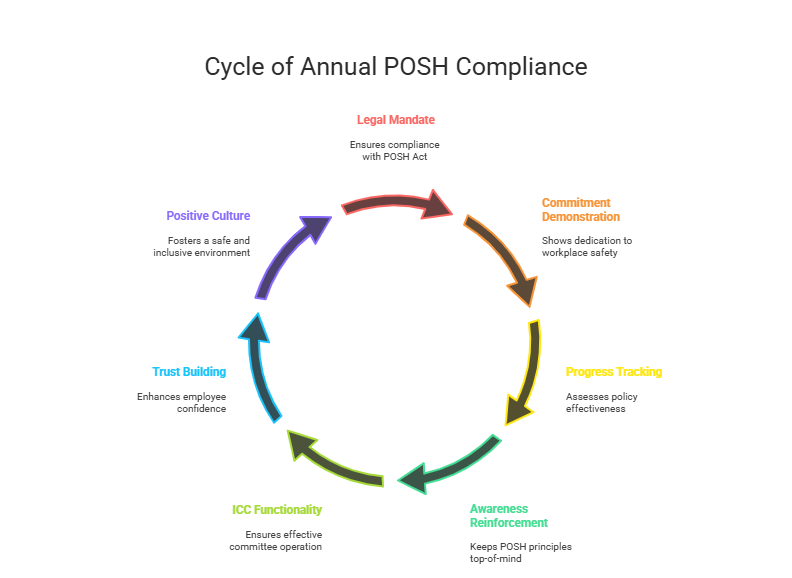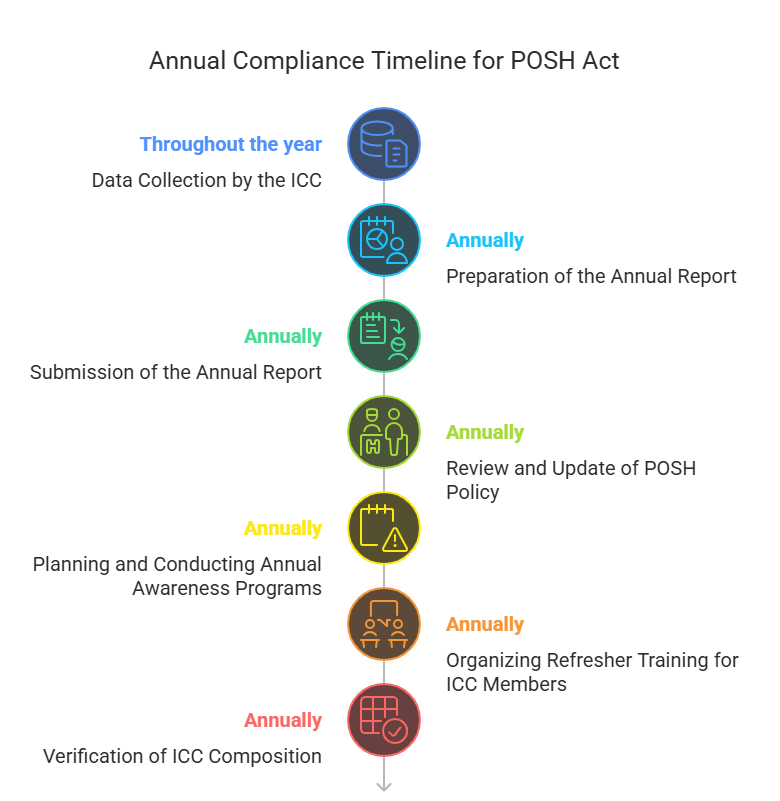Annual compliance under the POSH Act 2013 is important because it ensures that organizations are continuously working towards preventing and addressing sexual harassment in the workplace, and that they are meeting their legal obligations. It's not a one-time activity but an ongoing process.

Breakdown of its key aspects:
Why Annual Compliance is Important:
- Legal Mandate: The POSH Act mandates certain annual requirements, and non-compliance can lead to penalties and legal repercussions for the employer.
- Demonstrates Commitment: Regular compliance activities show the organization's ongoing commitment to creating and maintaining a safe and respectful workplace for all employees.
- Tracks Progress and Identifies Issues: Annual reports and reviews help the organization assess the effectiveness of its POSH policy and identify any emerging trends or areas that need improvement.
- Reinforces Awareness: Regular activities like awareness programs and refresher training help keep the principles of the POSH Act top-of-mind for employees.
- Ensures the ICC is Functional: Annual requirements often involve reviewing the composition and functioning of the Internal Complaints Committee (ICC) to ensure it is effective and compliant with the Act.
- Builds Trust and Confidence: Employees are more likely to trust that the organization takes their safety seriously if they see consistent efforts towards POSH compliance.
- Supports a Positive Work Culture: A workplace that actively works to prevent harassment contributes to a more positive, productive, and inclusive work environment.
When Annual Compliance Has to Be Done:
The POSH Act 2013 and its rules specify certain annual requirements. The most prominent is the Annual Report.
Why it is Important:
- Annual Report Submission: The Internal Complaints Committee (ICC) is required to prepare an annual report with specific details and submit it to the employer and the District Officer.
- Timeline for Annual Report: While the Act itself doesn't specify a fixed date, the rules framed under the Act by different states may vary. Generally, it is expected to be submitted at the end of the financial year or calendar year, as specified by the relevant state rules. You should check the specific rules applicable to your location (Delhi, in your case, based on the time context).
- Other Annual Activities: Beyond the report, annual compliance also implies regular activities throughout the year, such as:
- Conducting awareness programs for employees.
- Organizing refresher training for ICC members.
- Reviewing and updating the POSH policy if needed.
- Ensuring the ICC composition is compliant.

How Annual Compliance is done:
Annual compliance involves several steps and activities:
- Data Collection by the ICC: Throughout the year, the ICC needs to maintain records of complaints received, inquiries conducted, resolutions reached, and awareness activities undertaken. This data forms the basis of the annual report.
- Preparation of the Annual Report: The ICC prepares the annual report, which typically includes the following information (as per the Act and rules):
- Number of complaints of sexual harassment received in the year.
- Number of complaints disposed of during the year.
- Number of cases pending for more than 90 days.
- Nature of action taken by the employer or the IC.
- Number of awareness programs or workshops conducted.
- Nature of assistance provided by the employer to the aggrieved women.
- Number of employers against whom action has been taken for non-compliance with the Act.
- Submission of the Annual Report: The ICC submits the signed annual report to:
- The employer (the management of NBC Elite Solutions).
- The District Officer. The designated authority for receiving these reports varies by state. You will need to identify the relevant District Officer for Delhi.
- Review and Update of POSH Policy: Annually, the organization should review its POSH policy to ensure it is up-to-date with the Act and any amendments, and that it effectively addresses the specific needs of the workplace.
- Planning and Conducting Annual Awareness Programs: Organizations should plan and conduct regular awareness sessions for all employees to educate them about the POSH Act, the company's policy, and the complaint mechanism.
- Organizing Refresher Training for ICC Members: ICC members should undergo refresher training annually to stay updated on the legal requirements, best practices for conducting inquiries, and handling sensitive cases.
- Verification of ICC Composition: The organization needs to ensure that the composition of the ICC remains compliant with the requirements of the POSH Act, including the required number of members and the presence of an external member.
In summary, annual compliance under the POSH Act is a continuous process culminating in the submission of an annual report and the ongoing implementation of preventive and redressal measures. It is crucial for legal adherence, fostering a safe workplace, and demonstrating the organization's commitment to preventing sexual harassment. To ensure full compliance, NBC Elite Solutions should be aware of the specific rules and timelines prescribed by the Delhi state government under the POSH Act.





